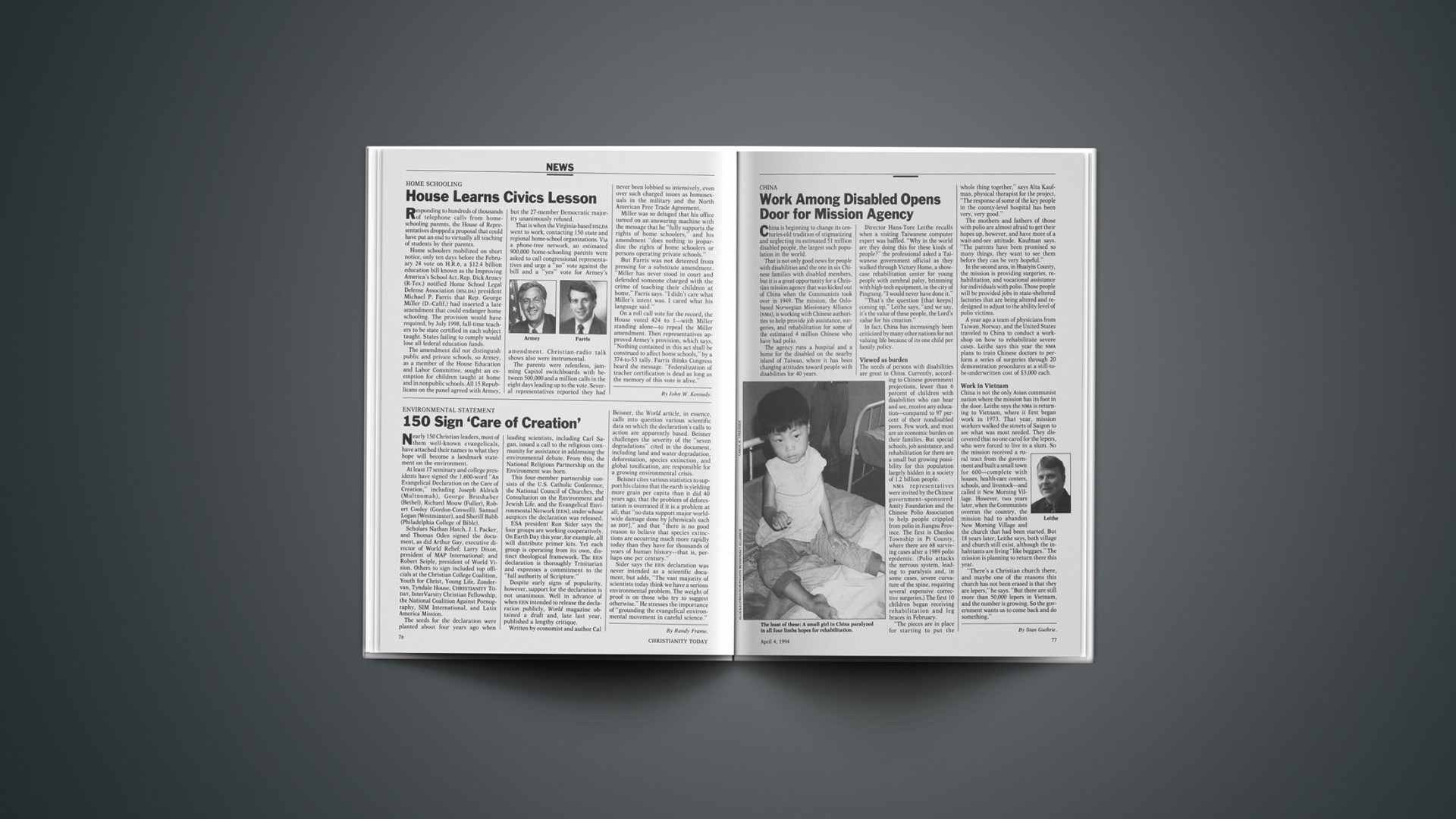China is beginning to change its centuries-old tradition of stigmatizing and neglecting its estimated 51 million disabled people, the largest such population in the world.
That is not only good news for people with disabilities and the one in six Chinese families with disabled members, but it is a great opportunity for a Christian mission agency that was kicked out of China when the Communists took over in 1949. The mission, the Oslo-based Norwegian Missionary Alliance (NMA), is working with Chinese authorities to help provide job assistance, surgeries, and rehabilitation for some of the estimated 4 million Chinese who have had polio.
The agency runs a hospital and a home for the disabled on the nearby island of Taiwan, where it has been changing attitudes toward people with disabilities for 40 years.
Director Hans-Tore Leithe recalls when a visiting Taiwanese computer expert was baffled. “Why in the world are they doing this for these kinds of people?” the professional asked a Taiwanese government official as they walked through Victory Home, a showcase rehabilitation center for young people with cerebral palsy, brimming with high-tech equipment, in the city of Pingtung. “I would never have done it.”
“That’s the question [that keeps] coming up,” Leithe says, “and we say, it’s the value of these people, the Lord’s value for his creation.”
In fact, China has increasingly been criticized by many other nations for not valuing life because of its one child per family policy.
Viewed as burden
The needs of persons with disabilities are great in China. Currently, according to Chinese government projections, fewer than 6 percent of children with disabilities who can hear and see, receive any education—compared to 97 percent of their nondisabled peers. Few work, and most are an economic burden on their families. But special schools, job assistance, and rehabilitation for them are a small but growing possibility for this population largely hidden in a society of 1.2 billion people.
NMA representatives were invited by the Chinese government-sponsored Amity Foundation and the Chinese Polio Association to help people crippled from polio in Jiangsu Province. The first is Chenlou Township in Pi County, where there are 68 surviving cases after a 1989 polio epidemic. (Polio attacks the nervous system, leading to paralysis and, in some cases, severe curvature of the spine, requiring several expensive corrective surgeries.) The first 10 children began receiving rehabilitation and leg braces in February.
“The pieces are in place for starting to put the whole thing together,” says Alta Kaufman, physical therapist for the project. “The response of some of the key people in the county-level hospital has been very, very good.”
The mothers and fathers of those with polio are almost afraid to get their hopes up, however, and have more of a wait-and-see attitude, Kaufman says. “The parents have been promised so many things, they want to see them before they can be very hopeful.”
In the second area, in Huaiyin County, the mission is providing surgeries, rehabilitation, and vocational assistance for individuals with polio. Those people will be provided jobs in state-sheltered factories that are being altered and redesigned to adjust to the ability level of polio victims.
A year ago a team of physicians from Taiwan, Norway, and the United States traveled to China to conduct a workshop on how to rehabilitate severe cases. Leithe says this year the NMA plans to train Chinese doctors to perform a series of surgeries through 20 demonstration procedures at a still-to-be-underwritten cost of $3,000 each.
Work in Vietnam
China is not the only Asian communist nation where the mission has its foot in the door. Leithe says the NMA is returning to Vietnam, where it first began work in 1973. That year, mission workers walked the streets of Saigon to see what was most needed. They discovered that no one cared for the lepers, who were forced to live in a slum. So the mission received a rural tract from the government and built a small town for 600—complete with houses, health-care centers, schools, and livestock—and called it New Morning Village. However, two years later, when the Communists overran the country, the mission had to abandon New Morning Village and the church that had been started. But 18 years later, Leithe says, both village and church still exist, although the inhabitants are living “like beggars.” The mission is planning to return there this year.
“There’s a Christian church there, and maybe one of the reasons this church has not been erased is that they are lepers,” he says. “But there are still more than 50,000 lepers in Vietnam, and the number is growing. So the government wants us to come back and do something.”
By Stan Guthrie.










